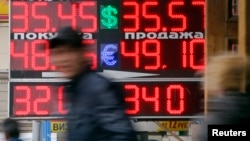MOSCOW —
Russia's economy is likely to shrink again in the second quarter of 2014, a senior finance ministry official was quoted as saying on Tuesday, after contraction began in the first three months of the year.
The ministry said economic performance in the third quarter would largely depend on the level of geopolitical uncertainty, a clear reference to the crisis over neighboring Ukraine, which has seen Western sanctions imposed and scared off investors.
Maxim Oreshkin, director of the ministry's long-term planning department, said output of electricity, freight transport and gas production had been weak in April and that business activity indicators did not give rise for optimism, according to the state-run RIA Novosti news agency.
“Everything points to GDP [gross domestic product] for the second quarter declining compared with the previous quarter, seasonally adjusted, for the second time in a row,” Oreshkin was quoted as saying.
The forecast was in line with the view of the International Monetary Fund, which said last week that Russia was already “experiencing recession”.
Earlier on Tuesday, the Organization for Economic Cooperation and Development cut its forecast for Russian growth this year by almost four-fifths, to 0.5 percent from a previous 2.3 percent, saying the impact of events in Ukraine had halted a modest recovery under way at the end of 2013.
The IMF last week took an even more gloomy view, cutting its 2014 growth forecast for Russia's oil- and gas-based economy to just 0.2 percent from an earlier 1.3 percent.
Russia's economy grew 1.3 percent last year.
The IMF said Ukraine-related sanctions, imposed by the United States and the European Union, were scaring off investors.
Russia's central bank unexpectedly raised interest rates for the second time in less than two months on April 25, hiking its main rate by 50 basis points to 7.5 percent to prevent a weakening rouble fuelling inflation.
The finance ministry had said last month that growth in the remaining quarters of this year would be close to zero and could contract in one of them.
The economy ministry has said the economy contracted by 0.5 percent in the first quarter and that growth may not exceed 0.5 percent for the year.
Oreshkin was quoted as saying third-quarter performance would also depend on how sharply bank lending slowed against the background of the central bank's rate rise and “a substantial rise in money market rates.”
The ministry said economic performance in the third quarter would largely depend on the level of geopolitical uncertainty, a clear reference to the crisis over neighboring Ukraine, which has seen Western sanctions imposed and scared off investors.
Maxim Oreshkin, director of the ministry's long-term planning department, said output of electricity, freight transport and gas production had been weak in April and that business activity indicators did not give rise for optimism, according to the state-run RIA Novosti news agency.
“Everything points to GDP [gross domestic product] for the second quarter declining compared with the previous quarter, seasonally adjusted, for the second time in a row,” Oreshkin was quoted as saying.
The forecast was in line with the view of the International Monetary Fund, which said last week that Russia was already “experiencing recession”.
Earlier on Tuesday, the Organization for Economic Cooperation and Development cut its forecast for Russian growth this year by almost four-fifths, to 0.5 percent from a previous 2.3 percent, saying the impact of events in Ukraine had halted a modest recovery under way at the end of 2013.
The IMF last week took an even more gloomy view, cutting its 2014 growth forecast for Russia's oil- and gas-based economy to just 0.2 percent from an earlier 1.3 percent.
Russia's economy grew 1.3 percent last year.
The IMF said Ukraine-related sanctions, imposed by the United States and the European Union, were scaring off investors.
Russia's central bank unexpectedly raised interest rates for the second time in less than two months on April 25, hiking its main rate by 50 basis points to 7.5 percent to prevent a weakening rouble fuelling inflation.
The finance ministry had said last month that growth in the remaining quarters of this year would be close to zero and could contract in one of them.
The economy ministry has said the economy contracted by 0.5 percent in the first quarter and that growth may not exceed 0.5 percent for the year.
Oreshkin was quoted as saying third-quarter performance would also depend on how sharply bank lending slowed against the background of the central bank's rate rise and “a substantial rise in money market rates.”





